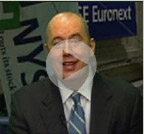(Bloomberg).- For years, the global economy surfed a flood of easy money from central banks and a surge in Chinese demand for commodities. Now, policy makers are trying to anticipate what’s exposed when the tide goes out.
“This is a pretty unforgiving environment,” and “not a type of economy in which one can make mistakes,” Bank of England Governor Mark Carney said Thursday at annual meetings of the International Monetary Fund and World Bank in Lima. “Everybody needs to recognize there isn’t going to be a big surge of demand from abroad.”
Hobbled by the after-effects of the financial crisis, the world economy faces the prospect of the first rate increase by the Federal Reserve in almost a decade, China’s transition to more consumer-led growth and a slump in the price of everything from oil to copper. All three present “massive” challenges, IMF Managing Director Christine Lagarde said.
The disappointing global recovery -- and the risk of market turmoil should the picture darken -- will be on the agenda this week as Group of 20 central bankers and finance chiefs meet in the Peruvian capital.
Delaying Liftoff
In an interview on Bloomberg Television, Lagarde reiterated the IMF’s view that the Fed has scope to leave the benchmark policy rate near zero, with inflation running below the central bank’s 2 percent target.
And she warned policy makers to expect some turbulence from China’s economic and financial reforms.
“China is moving, and predictably so, from an investment-driven model to a more consumption-driven model, and this is a choice, this is deliberate,” she said. “It will not be without bumps on the road, but it’s a good evolution and it’s legitimate at that stage of development.”
Chinese policy makers are committed to moving to a more market-determined exchange rate as part of the country’s economic reforms, Lagarde said.
“This is an enormous change which is difficult to absorb, difficult to manage, difficult to communicate,” she said. “I do believe that the Chinese authorities understand that phenomenon, want to play by the rules, want to monitor expectations as much as they can.”
Domestic Demand
Those challenges aside, Carney signaled monetary policy makers should still focus on their domestic obligations, and not be bound by external developments or decisions taken elsewhere. For instance, the “exact timing of a Fed move is not decisive for the timing” of an interest rate increase in the U.K., Carney said, adding that wage-price pressures have been building there.
While countries have the capacity to deal with the global economy’s many challenges, it’s uncertain whether they have the political will to deliver, U.S. Treasury Secretary Jacob J. Lew told reporters in Lima.
Lew highlighted the delicate balance between stimulating domestic demand and measures designed to give countries an unfair advantage. “We can’t get into a beggar-thy-neighbor kind of economic policy making,” he said.
What’s worse, gloom about the global economy may be obscuring the strength of recoveries under way in the U.K., the U.S. and even the euro area, where policy makers are still vacillating on the need for an expansion to the European Central Bank’s $1.24 trillion euro ($1.4 trillion) quantitative easing program.
‘Seeping Pessimism’
“The economic environment is characterized by seeping pessimism about long-term growth,” ECB Executive Board member Peter Praet said on Thursday in Mannheim, Germany. While a cyclical recovery “is progressively taking hold,” the negative stance “holds back a stronger recovery,” he said.
The IMF has been one of the loudest voices warning of a downshift in the pace of global output. A slowdown in emerging markets driven by weak commodity prices forced the Washington-based IMF to cut its outlook this week for global growth in 2015 to 3.1 percent from a July forecast of 3.3 percent.
The IMF warned this week that over-borrowing by companies has left emerging economies vulnerable to financial stress and capital outflows.
Capital Outflows.
In 2015, emerging markets will see their first year of negative capital flows since 1988, as investors pull $541 billion from countries such as China and Brazil, the Institute of International Finance said in a report last week.
“We don’t really see the end of low commodity prices anytime in the near future,” World Bank President Jim Yong Kim said in an interview with Bloomberg TV. “Of course, that creates even more headwinds for Latin America certainly, but for many more emerging-market countries.”
The World Bank is seeing “exploding” demand for loans as credit conditions tighten for emerging markets, he said.
“They’re going to be compared now across the board, and those that get capital are the ones who move most quickly in terms of making the reforms. De-risking is happening everywhere,” Kim said.








